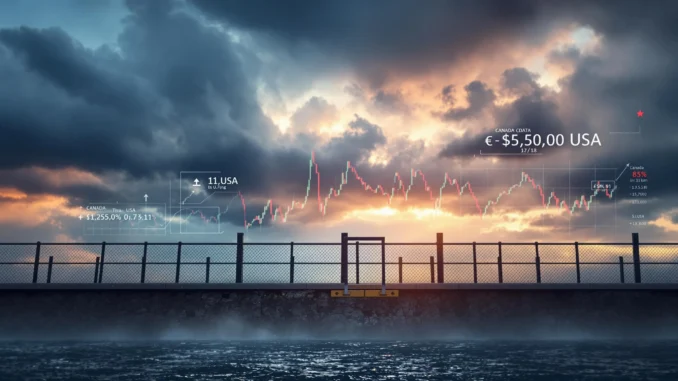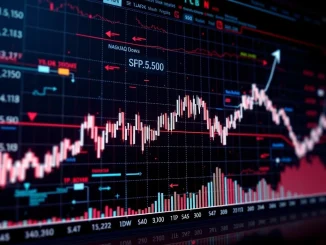
Hold onto your hats, crypto enthusiasts! In a shocking turn of events that’s sending ripples through global markets, Canada has just dropped a bombshell. Prime Minister Justin Trudeau announced a hefty 25% tariff on a staggering $107 billion worth of United States goods. Yes, you read that right – Canada tariffs are now a reality, and the implications are massive. While you might be wondering what this has to do with crypto, remember that global economic shifts like these can have a significant impact on all markets, including the digital asset space. Let’s dive into what’s happening and why it matters.
What’s Behind the Shocking Canada Tariffs?
On March 3rd, Prime Minister Justin Trudeau declared that Canada would impose retaliatory tariffs on C$155 billion (that’s $107 billion USD) of U.S. goods. This wasn’t a spur-of-the-moment decision; it’s a direct response to ongoing U.S. trade actions that Canada views as unfair and detrimental. Trudeau made it crystal clear – these Canada tariffs will remain firmly in place until the U.S. withdraws its trade measures. He even hinted at further ‘non-tariff measures’ if the situation escalates. This firm stance signals a significant hardening in Canada’s approach to trade disputes with its southern neighbor.
To break it down, here are the key points:
- Massive Scale: $107 billion worth of US goods are now subject to a 25% tariff in Canada.
- Retaliatory Measure: These Canada tariffs are a direct response to U.S. trade actions.
- Duration: The tariffs will stay until the U.S. changes its trade policies that Canada objects to.
- Potential Escalation: Canada is considering even more measures beyond tariffs if needed.
The Broader Context: Navigating the US Trade War
This move by Canada isn’t happening in a vacuum. It’s crucial to understand the backdrop of the ongoing US trade war. For years, the global trade landscape has been increasingly fraught with tensions, often initiated by the U.S. under the banner of ‘America First’ policies. These policies have included tariffs on steel, aluminum, and various other goods from countries around the world, including Canada. While the specific U.S. trade actions prompting these Canada tariffs weren’t explicitly named in the initial reports, it’s widely understood to be linked to long-standing disagreements on trade practices and protectionist measures.
The US trade war is not just about numbers and percentages; it’s about:
| Aspect | Description |
|---|---|
| Geopolitical Implications | Trade disputes can strain international relations and alliances, impacting diplomatic ties and global stability. |
| Supply Chain Disruptions | Tariffs can disrupt established supply chains, leading to higher costs for businesses and consumers. |
| Economic Uncertainty | Trade wars create uncertainty in markets, affecting investment decisions and overall economic growth. |
| Inflationary Pressures | Increased tariffs can lead to higher prices for imported goods, contributing to inflation. |
Global Trade Tensions: A World on Edge?
Canada’s imposition of Canada tariffs adds another layer to already simmering global trade tensions. We’re not just talking about a bilateral dispute between two countries; this is part of a larger pattern of trade friction worldwide. From the US-China trade disputes to Brexit’s impact on European trade, the global economy is navigating a complex web of tariffs, trade barriers, and protectionist policies.
Why should you care about global trade tensions, especially in the crypto world?
- Market Volatility: Trade tensions fuel uncertainty, which often translates to increased volatility in financial markets, including crypto.
- Investment Flows: Shifts in global trade can alter investment flows. Investors might seek safe havens or diversify assets, potentially impacting crypto markets.
- Economic Slowdown: Widespread trade wars can contribute to a global economic slowdown, which could affect all asset classes, including cryptocurrencies.
- Decentralization Appeal: In times of economic uncertainty and government intervention in trade, the decentralized nature of crypto might become even more appealing as an alternative financial system.
The Economic Impact: Beyond Borders and Tariffs
The economic impact of these Canada tariffs extends far beyond just the goods being taxed. Economists warn that tariffs can have a ripple effect, impacting various sectors and potentially leading to:
- Increased Consumer Prices: Tariffs are often passed on to consumers in the form of higher prices for goods.
- Reduced Business Competitiveness: Businesses reliant on imported goods subject to tariffs may become less competitive.
- Job Losses: In sectors affected by tariffs, there could be job losses due to reduced demand or business closures.
- Slower Economic Growth: Overall, trade wars and tariffs can dampen economic growth both domestically and globally.
For the crypto community, understanding the economic impact is crucial. Macroeconomic factors heavily influence market sentiment and investment decisions. A slowdown in global trade or increased inflation due to tariffs could indirectly affect the crypto market’s performance and investor behavior.
Justin Trudeau‘s Gamble: A Risky but Calculated Move?
Justin Trudeau‘s decision to impose these tariffs is undoubtedly a gamble. It’s a bold move that could escalate trade tensions further but also a calculated risk aimed at forcing the U.S. to reconsider its trade policies. Trudeau is betting that the economic impact on the U.S. from these tariffs will be significant enough to prompt a change in course. His statement about considering ‘non-tariff measures’ suggests Canada is prepared to play hardball if necessary.
Whether this strategy will succeed remains to be seen. Trade negotiations are complex and often unpredictable. However, Justin Trudeau‘s firm stance sends a clear message: Canada is not willing to be a pushover in trade disputes and is prepared to defend its economic interests aggressively.
Navigating the Trade Turbulence: What Can You Do?
So, what actionable insights can we glean from this escalating trade situation?
- Stay Informed: Keep a close eye on developments in the US trade war and global trade tensions. News sources specializing in economics and trade will be invaluable.
- Diversify Your Portfolio: In times of economic uncertainty, diversification is key. Don’t put all your eggs in one basket, whether it’s crypto or traditional assets.
- Consider Safe Haven Assets: Some investors might look to safe haven assets during trade wars. While crypto’s ‘safe haven’ status is debated, some cryptocurrencies like Bitcoin are sometimes considered as such.
- Long-Term Perspective: Remember that economic cycles and trade disputes are often temporary. Maintain a long-term perspective in your investment strategies.
Conclusion: The Shockwaves of Trade Wars
The Canada tariffs on $107 billion of US goods are a shocking reminder of the fragility of global trade and the escalating tensions in the world economy. While the immediate impact might seem distant from the crypto sphere, the broader economic impact and global trade tensions have the potential to create ripples across all markets. Staying informed, adapting your strategies, and understanding the interconnectedness of the global economy are crucial in navigating these turbulent times. The US trade war and retaliatory measures like these Canada tariffs are not just headlines; they are real-world events that can shape the financial landscape for everyone, including crypto investors. Keep watching, keep learning, and stay prepared for the unexpected in this ever-evolving global economy.



